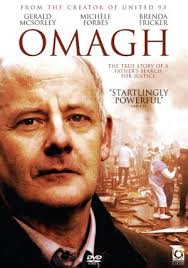
OMAGH
UK, 2004, 106 minutes, Colour.
Gerard Mc Sorley, Michele Forbes, Brenda Fricker.
Directed by Pete Travis.
Omagh is a powerful film made for television by director Pete Travis, (Vantage Point, Endgame, Dredd, Legacy). It was co-written by Paul Greengrass who two years earlier had made the film about Ireland and The Troubles, Bloody Sunday. It features Irish actor, Gerard Mc Sorley, who gives a most moving performance.
A bomb was exploded in the centre of Omagh in Northern island in 1998, killing a number of people and wounding others as well as causing grief to the families of the dead. This film is based on information and events.
The prologue shows the bombers setting up the bomb, bringing it to the town. There was a warning 30 minutes in advance but, for whatever reason, the exact location of the bomb was misinterpreted and there was a greater loss of life.
Part of the impact of the film, especially with hand-held camera, is the explosion itself, the aftermath, the dead and wounded, the hospitals, people searching for loved ones amongst the dead and injured. And the film also focuses on one family, that of Michael Gallagher, whose son Aidan was killed. The film shows his search but also shows his response, his going to meetings, his speech urging everyone to be involved in discovering the truth. He was also interviewed the papers and for the British BBC television show, Panorama. He also interviewed an informer, Fulton, whose testimony was later discredited. While he persevered with his campaign, it took a great toll emotionally on his wife and on his daughter who challenged him to be caring for them more than for the others for whom he was campaigning.
There is a strong ending with Brenda Fricker as the ombudsman delivering her verdict on investigations into the situation, the bombers, and especially the police and their responsibilities.
The film is informative as well as very moving.
1. The true story of the bombing in Omagh? The facts, the memories? The impact in Ireland in 1998? The IRA, the Real IRA, the background of decades of The Troubles?
2. The locations, the countryside outside the town, the town itself, the Main Street, homes, hospitals? An ordinary day? The day starting up, the shops, the people, the radio broadcasts? The increasingly busy day?
3. The hand-held camera work, the sense of immediacy?
4. The problem, the men preparing the bomb, carrying it in the car? The intercutting with the cars, the men, setting it up?
5. The focus on the Gallagher family, their day, starting, breakfast, talking, going out, Michael and his son in the garage? Aidan and his friend going into town?
6. The phone call warning of the explosion, 30 minutes, the woman listening, slow, checking everything, writing it down, giving it to the police, the reaction of the police, moving people away from the alleged site? The explosion, the shock, the aftermath, the injuries?
7. The Gallagher family, the aftermath, Michael and his search? At the site, going to the hospital, trying to find news of Aidan? Identifying his features? Back home and the rest of the family, the mother, the sister, the grief?
8. The priest and the Anglican minister, both helping, friendly, comforting? The priest at the funeral? The press, the aftermath, the guests, Michael and his wife alone?
9. The political situation, the Good Friday agreement, the Real IRA and their rebellions, Tony Blair and his words? Interventions and lack of intervention?
10. The families gathering together, the meeting, the feeling, issues of compensation, demanding arrests, argument amongst themselves? The outspoken
man attacking the British government?
11. Michael, his speech, his ecumenical outlook, everybody helping? The phone and the self-help? The police, the demands that evidence? The demonstrations? The phone calls? Panorama and the newspaper interviews? The effect on Michael, his wife and her growing exasperation?
12. Gerry Adams, his background, the IRA, his coming to talk with the grieving people, his attitudes, the politics?
13. The BBC, the identities, the meetings, the possible names?
14. Michael, his going to see Fulton, Fulton and the intensity of his witness, offering to name names – and the exposure as self-centred and fake?
15. The authorities, wanting information?
16. The report of the ombudsman, her review of the facts, the presentation, her sympathy for the victims, for the families, her assessment of the police, the lack of following leads, losing evidence, lack of accountability?
17. The comments on the politicians, the Englishman and the death of his son, the letters to Tony Blair, the bland answers?
18. Michael Gallagher, the personal effect, his interventions, his speeches, the contact with the media, the exhaustion, following leads, return home, working
in the garage, life going on?
19. The information at the end, the identification of the bombers, legal complexities, their not been brought to justice?